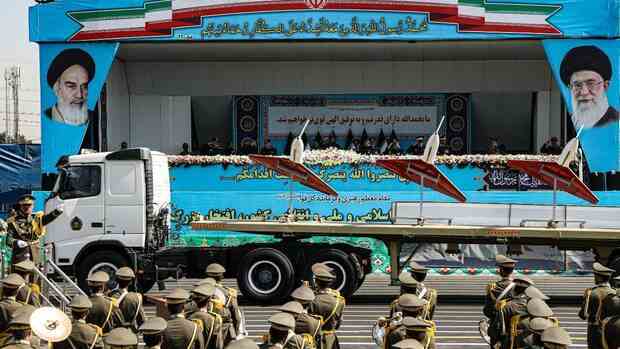“The current sanctions are much less effective than it looks on the outside,” the Republican US politician told the Handelsblatt. The 74-year-old, who is considering running for the US presidential election in 2024, calls for the punitive measures to be implemented much more strictly.
“If you put more pressure on the ailing regime now, you can bring it down,” Bolton said. “In my opinion, that should be the goal of the USA.” Iran is a growing danger for the Middle East – and thus also for the western world.
For more than three months, people in Iran have been protesting against the regime in Tehran, which is brutally hitting back: two demonstrators have already been executed. More than 20 others are on a death list.
>> Read also: Ukraine and Iran – two geostrategic hotspots also in 2023
The trigger for the nationwide protests was the death of the Iranian Kurd Jina Mahsa Amini. She died in police custody on September 16 after being arrested by the Morality Police for breaking the Islamic dress code.
At the end of the year, the West again increased the pressure on Iran. Also because there are other points of conflict in addition to human rights violations. The USA and Europe have criticized Tehran’s drone cooperation with Russia in the Ukraine war and accuse the regime of enriching uranium on a large scale.
In the days leading up to Christmas, the US froze the American assets of senior military officials in Tehran. A few days earlier, the EU had also agreed on a new round of sanctions to take a stand against human rights violations in Iran. But criticism of the effectiveness of the measures is growing.
The ayatollah state strives for military strength.
(Photo: IMAGO/ZUMA Wire)
“We must have no illusions: the effectiveness of sanctions is limited,” said Michel Duclos, former French ambassador and geopolitical adviser to the Institut Montaigne think tank. In the European Union it would help if the controls were carried out centrally by an EU authority.
Smaller countries in particular would find it difficult to do it alone, said Duclos. But: “There will always be ways to circumvent sanctions.” Countries like Iran in particular, which have been under sanctions for decades, would find alternative delivery routes.
India and Turkey are also circumventing the sanctions
“A number of countries are undermining the West’s sanctions regime,” confirms Meir Litvak, Iran specialist at Tel Aviv University. “There are both strategic and commercial interests behind this.”
According to Litvak, the sanction breakers include above all Russia, China, Turkey, India, Iraq and the United Arab Emirates, but also Venezuela, to which Iranian oil is transported under a foreign flag.
Russia and Iran are jointly looking for ways out of the sanctions trap. They are currently investing around $25 billion in a 3,000-kilometer trade route stretching from the eastern tip of Europe to the Indian Ocean.
The regime in Tehran is coming under pressure from global protests.
(Photo: IMAGO/aal.photo)
“This is intended to create a supply chain that cannot be interrupted by Western sanctions,” Maria Shagina of the London-based International Institute for Strategic Studies told Bloomberg. “Iran and Russia want to use all loopholes to transport sanctioned products and weapons.”
For years, the Islamic Republic has also thwarted American isolation efforts by building a parallel universe of front companies and foreign banks — including major financial institutions based in Europe, Dubai and the US. These are used by Iranian companies to circumvent international sanctions and conduct business abroad. Turkey is also helping Iranian banks circumvent the sanctions.
China also plays a key role in circumventing Western boycotts. The People’s Republic is one of Iran’s most important trading partners. In March 2021, both states also signed a document for 25 years of “comprehensive cooperation”, which was specified in 16 declarations of intent at the beginning of December.
Technology from western companies in Iranian drones
Recent publications indicate once again that enforcement of sanctions is a particular problem. This is how the Iranian drones, which Russia is supposed to use in the Ukraine war, were apparently made with the technology of Western companies.
The UK-based organization Conflict Armament Research dismantled one of the drones. She seized components from “more than 70 manufacturers from 13 different countries”, above all from the USA, which actually has strict export controls for dual-use technologies, i.e. those that can be used for both civil and military purposes.
The EU is struggling with a similar problem. The 27 countries are independently responsible for reporting violations of sanctions. But in practice, a lot goes under the radar, as the example of Russia shows: In October, US authorities uncovered a Russian front company based in Germany. The owners used it to smuggle US military technology for the Ukraine war. The whole thing went undiscovered for eight years.
The US Republican calls for more financial support for the opposition in Iran.
(Photo: imago images/Pacific Press Agency)
At least the EU oil embargo against Iran in 2012 initially had a major effect. Iran’s gross domestic product collapsed, inflation exploded – and the will to negotiate grew. “The desire for sanctions relief was a factor in Iran’s willingness to negotiate the nuclear deal,” says the Atlantic Council think tank.
Finally, the West was able to negotiate the JCPOA (Joint Comprehensive Plan of Action) nuclear deal with Tehran. In 2018, then US President Donald Trump pulled the US out of the JCPOA and massively increased the pressure to impose sanctions.
During the pandemic, the drop in oil prices shocked the Iranian economy. But over time, the Atlantic Council says, oil exports have largely recovered — in part because of thriving oil trade with China. The nuclear deal is currently on hold because the US currently does not believe a compromise with Iran is possible.
More: Second protester executed in Iran – EU plans further sanctions
